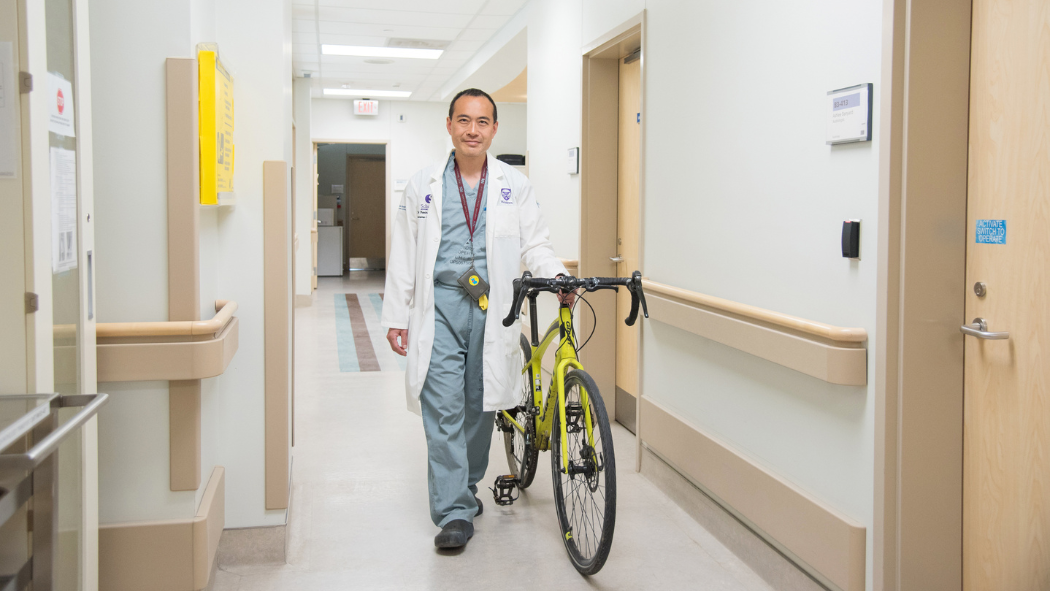
April 22, 2024
London Health Sciences Centre Otolaryngologist and Head and Neck Surgeon Dr. Kevin Fung rolls around his clinic on his office chair bringing his WOW (workstation on wheels) with him. He has his Powerchart (an electronic medical record system) and all the information for his patients on his screen. Gone are the days of overflowing paper files.
On New Year’s Eve in 2011, Dr. Fung made a commitment to focus on his health. He got rid of his parking transponder and began biking to work. This grew into an interest in planetary health, and changes he could make at work and at home to reduce his carbon footprint.
At home, his family air dries their laundry, composts and recycles, and has stopped using single use plastic products. They use public transit whenever possible, and keep their house at a refreshing 17.5 degrees during the winter. According to Dr. Fung, “we are fortunate - we can always put on more clothes.”
At work, the changes have been gradual and something he has been thinking about for years. “I've always known that going paperless would be better not just for planetary health, but for our patients – efficiency, accuracy, quality, etc. But how do you get there?”
The solution came in stages.
Small steps add up to big impact
Dr. Fung sits on the Thyroid Cancer London tumour board. They meet every other Tuesday to discuss cancer cases and one of the members suggested using Advanced Clinical Notes for documenting cases. One by one, members signed onto the tool and took turns taking notes. After a while, Dr. Fung was one of a few who had not volunteered. “I found myself to be in the minority. I was one of the only people sitting at the table who didn’t know how to do it and I felt guilty.”
So, he learned how. “One day I was in a good mood and I had consumed a lot of coffee, so I said, ‘Okay, I'm going to learn Advanced Clinical Notes’ and it was one of the best e-learning modules I’ve ever completed. I was amazed at its capabilities.”
The next step was to find a better way to manage referrals and patient communication. “We were receiving stacks and stacks of paper every day, predominately by fax, and I knew there had to be a better way.” The administrative staff did some research and figured out a solution. With help from our ITS HelpDesk team they have almost eliminated the use of paper – now, faxes are delivered directly as a PDF to the shared network. When it comes to patient correspondence, such as booking an appointment, filling out a questionnaire, or appointment notifications, that is all now done electronically.
Dr. Fung says there are some patients, for a myriad of reasons, that still want or need paper documentation, but in his experience, the majority appreciate the change. "Patients like the convenience of electronic prescriptions and correspondence.”
He is also taking steps to reduce waste in the operating room. Working with the LHSC Operating Room Planetary Health Intervention Team and the LHSC Green Team, he has identified surgical equipment and instruments that are not necessary. “Everything is wrapped in humongous pieces of disposable, non-recyclable covers. There is a bowl we use to hold towels. I asked myself, ‘why do I need this thing that looks like a salad bowl?’, I can just put the towels on a tray.”
According to Dr. Fung, one of the biggest benefits of going paperless is how it enables virtual care. “I no longer bring patients into my clinic to discuss test results. I can work remotely from anywhere and my patient doesn't have to take time off work, find childcare, drive to London, and add to carbon emissions just to have a 5-minute chat with me.”
He suggests this is one of the most impactful things clinicians can do if they are looking to reduce their carbon footprint. “Determining how you can optimize and increase use of remote care is a great place to start; it has benefits for both the patients and the physician.”
Supporting one another in going green
But in a world where the hum of technology is ever-present, Dr. Fung believes these changes must be declared a priority in the health-care sector to see broad change and calls on all leaders to prioritize planetary healthcare initiatives. He also suggests identifying role models throughout the hospital who have made changes to their practice.
“New practitioners will just do it. They are tech savvy. But us older practitioners, we need a nudge. I bought my first smartphone in August 2017, so I know what it's like to be a late adopter, but I managed. And every now and then I'll just sort of, nudge my colleagues. I’ll ask them, ‘Why don't you try doing it this way?’”
“Resistance to change is inevitable,” say Dr. Fung. “Some people think that going digital takes longer to do things, but I know from experience that it’s actually faster.” He admits there is some time investment at the beginning, but with the new, electronic medical record initiatives coming out, it'll save even more time and it will be a little bit less clunky and more palatable to those who haven't embraced it.
“It's our only planet. So, it's the right thing to do.”